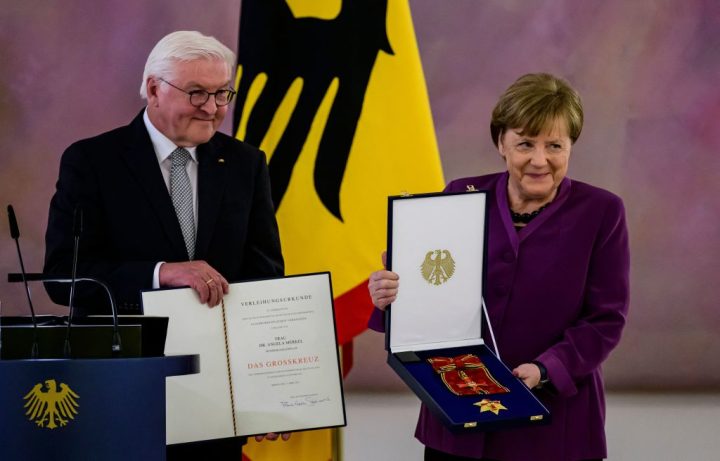It must rank as some form of political satire that Angela Merkel has been awarded Germany’s highest political honour. Not least because the former Chancellor will most likely be remembered foremost for turning a blind eye to the security threat posed by Russia.
The Grand Cross of the Order of Merit has previously been given to only two of Germany’s greatest postwar leaders. The first went to the Federal Republic’s first chancellor, Konrad Adenauer, who achieved the remarkable feat of reconciling West Germany with its former enemies, especially France, and, by supporting Nato, helped ensure his country became an integral part of the Western bloc. The other recipient is Helmut Kohl, who was responsible for German unification and created the European Union.
Merkel paid lip service to democratic ideals but this didn’t stop her making shabby deals with unsavoury regimes
It is more than an understatement to suggest that Merkel barely deserves mention in the same breath. Merkel led her nation for 16 long years. During that time her cautious and lowkey leadership style produced cult-like levels of devotion. She was often lauded as the only adult in the room, possessing unrivalled diplomatic skills and empathy, qualities deemed missing in many of her male counterparts on the world stage.
She was, for a time, anointed the anti-Trump and, in the words of no less an authority than the New York Times, ‘the liberal West’s last defender’. It turns out this was wishful thinking masquerading as political insight.
Russia’s invasion of Ukraine put paid to such Merkel worship. Her wilful blindness or ignorance – perhaps both – when it came to reading Putin’s motives and dealing with Russia ranks as postwar Germany’s gravest foreign policy error.
Merkel ignored the growing evidence of Putin’s repression, including the murderous silencing of political opponents. She appeared indifferent to Russian corruption and the country’s role in spreading disinformation. All that appeared to matter was access to cheap Russian gas. Long term strategic issues such as Europe’s security came a distant second.
This short term opportunism remained the case even after the Russian invasion of Crimea in 2014: Germany’s largest gas storage facilities were sold to Russia’s Gazprom regardless. It left Germany vulnerable and heavily dependent on Moscow for energy supplies. In 2020, it was estimated that Russia supplied more than half of Germany’s natural gas and about a third of all the oil that Germans used to heat homes and run factories. The Putin regime was quick to exploit this energy dependency as leverage in the wake of the Ukraine invasion.
Since leaving office, Merkel has expressed not a word of real regret or contrition over this colossal strategic misjudgment. There is no self-criticism and certainly no lessons learnt: ‘You always act in the time in which you find yourself,’ she told journalists in Lisbon last October when questioned about her government’s attitude towards Russia. That is as complacent and self-serving an explanation as you will ever hear from any political leader, especially one as experienced as Merkel.
Her handling of China, another autocracy with illicit territorial designs over its neighbours, is arguably just as big a strategic error. Here too Merkel aggressively pursued trade with Beijing, regardless of the wider consequences. It certainly paid off in the short term: China became Germany’s biggest trading partner, trebling its share of German exports – but at what long term strategic cost?
German manufacturers are now dangerously reliant on China for at least part of their supply chains. This closeness to China comes despite growing international concerns over Beijing’s human rights record and its increasingly bellicose attitude towards Taiwan.
Once again Merkel is revealed as a leader who made the wrong calls on the big issues. Her approach, dubbed ‘quiet diplomacy’ because it avoided explicit criticism of the Chinese regime, smacks of exactly the same kind of appeasement shown towards Russia. Merkel simply paid lip service to democratic ideals but this didn’t stop her making shabby deals with unsavoury regimes.
The same disconnect between rhetoric and reality is evident in her patchy domestic record. Merkel was lauded in some quarters for her controversial open-border policy during the 2015 migrant crisis. But she did little to win over voters, leading to a surge in support for far-right populist parties like the Alternative for Germany (AfD). The military under her watch has been enfeebled to the point where Germany is struggling to pull its weight when it comes to Nato commitments. All of this deserves fierce condemnation rather than grand prizes.
The decision to honour Merkel shines a far from flattering light on a cosy German political establishment that is complacent, inward-looking and out of touch with the real world. The only award Merkel really merits is one for leaving her country and the rest of Europe perilously exposed to its war-hungry Russian neighbour.







Comments